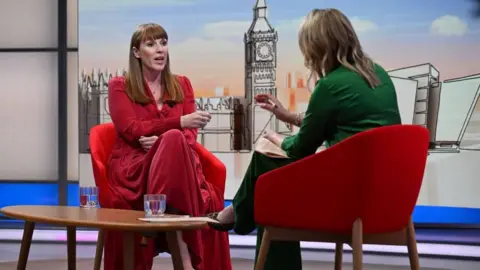In recent discussions regarding government policy on child benefits, Deputy Prime Minister Angela Rayner faced scrutiny over the controversial two-child benefit cap. This cap limits the eligibility of families to claim means-tested benefits for any third or additional children born after April 2017. On Sunday, during an interview with Laura Kuenssberg of BBC, Rayner was asked about the potential for abolishing this limit, particularly in light of reports that Sir Keir Starmer, the leader of the Labour Party, privately supported the idea and had requested the Treasury to find £3.5 billion to facilitate this change.
Rayner, however, remained non-committal. When pressed on whether she would like to see the cap eliminated, she stated, “I’m not going to speculate on what our government is going to do.” Instead, she highlighted the work of the newly established Child Poverty Taskforce, which has been considering measures for combating child poverty, including the possible removal of the two-child cap. Her response indicated a broader approach to addressing the various challenges in child poverty rather than focusing on singular policy changes.
The discussion unfolds against the backdrop of delays to the government’s child poverty strategy, which was initially anticipated for publication in the spring. The strategy is now expected to be outlined in the autumn. In a recent development, a memo from Rayner’s department was leaked to the Daily Telegraph. This memo reportedly suggested that the Chancellor should consider “clawing back” child benefit payments from wealthier families among other proposals. When asked if she supported the contents of the memo, Rayner chose not to express any backing for the specific measures, reiterating her focus on the broader agenda around child poverty.
During the interview, Rayner was emphatic in her denial of being connected to the leak, asserting, “I do not leak. I think leaks are very damaging.” This denial may stem from speculation within political circles that some members of the Labour Party perceive her as positioning herself for a leadership challenge against Starmer. Rayner firmly stated, “I do not want to run for leader of the Labour Party,” emphasizing that her current role as Deputy Prime Minister is an honor she cherishes.
Addressing claims of discord within the government, Rayner expressed confidence in the stability of Starmer’s cabinet, stating, “I can reassure you the government is solid.” These comments come amidst ongoing discussions around various financial support structures, including winter fuel payments, with the government recently reversing proposed cuts after considerable public pressure.
Looking ahead, Starmer indicated that changes to the child benefit policy, including the two-child cap, may be presented in the forthcoming autumn Budget. Rayner confirmed that any definitive changes would be for Shadow Chancellor Rachel Reeves to articulate at the “next fiscal event.” As the government navigates these complex policies, the discourse around child benefits and poverty is likely to remain a hot topic in the political arena as decisions are anticipated to impact many families across the country.
In summary, while the future of the two-child benefit cap hangs in the balance, it presents an opportunity for relaying larger issues of child poverty and the government’s approach to tackling these challenges. The ongoing consultations and strategy reviews led by Angela Rayner’s department will undoubtedly shape the narrative around this policy as the autumn approaches and budget decisions loom.



